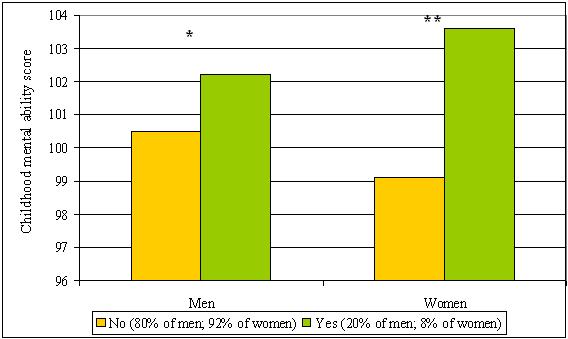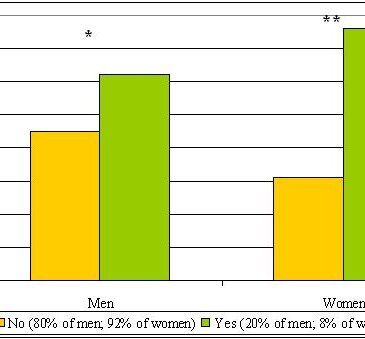Cognitive epidemiology is a small but growing area of research (Deary, 2005). Early studies in this field show a link between cognitive functioning and health (Deary & Batty, 2006); more recently, the field has connected mental ability to a variety of other behaviors, such as vegetarianism (Gale, Deary, Schoon, & Batty, 2007) and voting preferences (Deary, Batty, & Gale, 2008). This week’s DRAM explores a study that links the mental ability of ten year old children to their drinking behavior as 40 year old adults (Batty, G.D., Deary, I.J., Schoon, I., Emslie, C., Hunt, K., et al. 2008).
Methods
- Investigators associated with the 1970 British Cohort Study assessed the cognitive ability of 11,040 10 year olds and generated a mental ability score for each child (Butler N. & J., 1997).
- The average mental ability score for the sample was 100 points; the standard deviation for this sample was 15 points.
- Thirty years later, the researchers completed a follow-up survey with the participants (n=8,170; response rate = 74%), which assessed a number of alcohol-related variables, including participants’ responses to the CAGE (Ewing, 1984).
- The authors used ANOVA to examine the relationship between mental ability and CAGE response scores.
Results

Figure. Proportion of sample who ever had a drinking problem (2 or more endorsements of CAGE questions) and childhood IQ score, by gender (adapted from Batty et al., 2008). Click image to enlarge.
*p<.01; **p<.001
- People who had higher mental ability scores as children were more likely to endorse CAGE questions than those who had lower mental ability scores as children. This effect was stronger for women than men (see Figure).
- Women who ever had an alcohol problem scored an average of 4.5 points higher on the mental ability assessment as girls than women without an alcohol problem; men with an alcohol problem scored an average of 1.7 points higher as boys (effect size of d=.31 for women and d=.11 for men).
Limitations
- The researchers collected drinking information using participants’ self report.
- The researchers measured a small number of potential mediators, so an unmeasured variable could influence the relationship between childhood mental ability and later drinking problems.
- The researchers used mental ability scores, which were derived from a short-hand test of cognitive function and might not accurately represent the participants’ mental ability.
- The final analyses of alcohol problems did not include over a quarter of adults who, as children, enrolled in the study. Those lost to follow-up might have had more – or less – severe alcohol problems than those included in the final analyses.
- Without a conceptual framework to explain the relationship between childhood mental ability and later drinking problems, the meaningfulness of this association is difficult to interpret.
Conclusion
The reason behind the mental ability-drinking relationship is not clear, and there is not yet a theoretical framework to offer an explanation. Those with a high mental ability might be more willing to report drinking patterns, have more expendable income, or are members of social groups that are more accepting of drinking. The relationship might be more complicated: mental ability merely might serve as a proxy for some other unmeasured variables. A theoretical framework to explain this relationship is necessary to interpret the importance of this association and provide the guide for further research.
—Leslie Bosworth
What do you think? Please use the comment link below to provide feedback on this article.
References
Batty, G. D., Deary, I. J., Schoon, I., Emslie, C., Hunt, K., & Gale, C. R. (2008). Childhood Mental Ability and Adult Alcohol Intake and Alcohol Problems: The 1970 British Cohort Study. American Journal of Public Health, 98(12).
Butler N., & J., B. (1997). 1970 British Cohort Study: Ten-Year Follow-Up. Colchester, England: UK Data Archive.
Deary, I. J. (2005). Intelligence, health and death: the new field of cognitive epidemiology. Psychologist, 18, 610-613.
Deary, I. J., Batty, D. G., & Gale, C. R. (2008). Childhood intelligence predicts voter turnout, voting preferences, and political involvement in adulthood: The 1970 British Cohort Study. Intelligence, 36(6), 548-555.
Deary, I. J., & Batty, G. D. (2006). Commentary: Pre-morbid IQ and later health—the rapidly evolving field of cognitive epidemiology. International Journal of Epidemiology, 35(3), 670-672.
Ewing, J. A. (1984). Detecting alcoholism: The CAGE questionnaire. Journal of the American Medical Association, 252(14), 1905-1907.
Gale, C. R., Deary, I. J., Schoon, I., & Batty, G. D. (2007). IQ in childhood and vegetarianism in adulthood: 1970 British cohort study. British Medical Journal, 334(7587), 245.




